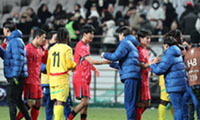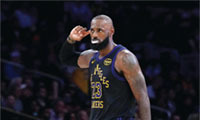▶ JOE NOCERA
The law essentially criminalizes most contact between sports agents and college athletes — something that heretofore had merely been a violation of N.C.A.A. rules. Agents who give athletes money are now violating the law. “Runners” who act as go-betweens for agents are violating the law. Agents who don’t announce to the university that they want to talk to an enrolled athlete are violating the law. It is a measure of how good a job the N.C.A.A. has done in brainwashing the country that the simple act of handing money to — or giving advice to — a college student is now against the law in most of the country when the recipient happens to play a sport.
(And you wonder why so many college football and men’s basketball players come out of school so ill-equipped for life? According to Sports Illustrated, some 78 percent of professional football players are either bankrupt or in serious financial trouble within two years of their retirement. Maybe if the N.C.A.A. encouraged players to get agents while they were still in school, instead of criminalizing such contact, athletes would be a little better prepared for what comes afterward. Instead, the N.C.A.A. views this activity as the work of “unscrupulous agents” who are “victimizing” athletes. But I digress.)Still, on anyone’s list of criminal activities, slipping a few bucks to the middle linebacker has to rank pretty low. Which perhaps explains why, so far as I can tell, no one had ever been indicted before for violating the law.
Until last month, that is. That’s when Jim Woodall, the top prosecutor in Orange County, N.C., egged on by the North Carolina Secretary of State’s Office, which had conducted a lengthy investigation, indicted five people for funneling “illegal” benefits to three former University of North Carolina football players.
At the center of this “conspiracy” is a small-time agent named Terry Watson, who, in 2010, is alleged to have given the three athletes in question a total of around $24,000. What he hoped for was that the players would use him as their agent when they went pro. (They didn’t.) The charge is “athlete agent inducement.” The other four were indicted on charges of being the supposed go-betweens. It is one of those alleged go-betweens I want to briefly focus on. It used to be that the N.C.A.A. could only wreck the lives of athletes. Now, it appears, thanks to the Uniform Athlete Agents Act, non-athletes can also have their lives wrecked by the N.C.A.A.
Between 2007 and 2009, Jennifer Wiley Thompson was an academic adviser for North Carolina athletes. Her original crime, in the eyes of the N.C.A.A., was giving athletes a little too much help. She wasn’t writing papers for them, but she was helping them make them better. When the football team became mired in a scandal in 2010, the help she had given became public knowledge. She, in turn, became a focal point in the news media. She not only lost her position as an academic adviser, but she lost her day job teaching grade school kids.
She has since lost a second job — and now faces the prospect of jail time for allegedly passing money to a player for plane tickets. “They are doing this because she helped people with their homework?” said Joseph Cheshire, her lawyer. “It is ridiculous. We don’t see where she broke the law. We’re going to war on this.” It is a war well worth waging. There is virtually no precedent to look to, so this case is likely to determine whether this law has any teeth. If the Orange County district attorney succeeds in his effort to prosecute the North Carolina five, it will mean that other prosecutors, in other jurisdictions, will follow suit. Going after someone who has tainted dear old State U. will be irresistible.
If, on the other hand, the cases go to trial and they are found not guilty, the law will be rendered meaningless, even if it remains on the books.
Meanwhile, in late October, a committee of the Uniform Law Commission met in Chicago to discuss revisions to — what else? — the Uniform Athlete Agents Act. According to Richard T. Cassidy, who writes the blog “On Lawyering,” the plan is to “expand the scope of the law and improve its effectiveness.” One proposal is to have the law cover high school and even elementary school athletes.
Thus does the long arm of the N.C.A.A. get that much longer.
스마터리빙
more [ 건강]
[ 건강]이제 혈관 건강도 챙기자!
[현대해운]우리 눈에 보이지 않기 때문에 혈관 건강을 챙기는 것은 결코 쉽지 않은데요. 여러분은 혈관 건강을 유지하기 위해 어떤 노력을 하시나요?
 [ 건강]
[ 건강]내 몸이 건강해지는 과일궁합
 [ 라이프]
[ 라이프]벌레야 물럿거라! 천연 해충제 만들기
 [ 건강]
[ 건강]혈압 낮추는데 좋은 식품
[현대해운]혈관 건강은 주로 노화가 진행되면서 지켜야 할 문제라고 인식되어 왔습니다. 최근 생활 패턴과 식생활의 변화로 혈관의 노화 진행이 빨라지고
사람·사람들
more
“이민 선구자들에 바치는 헌사”
이진영 감독은 이화여대 언론정보학/영상학과를 졸업하고 하와이로 이민왔다. 하와이 한국일보 기자, KBFD-TV 앵커 등으로 10년간 일하고 2…

김영화 수필가 ‘한국디지털문학상’ 대상
본보 화요칼럼 필진으로 활동하고 있는 수필가 김영화씨가 한국디지털문인협회(회장 김종회)가 주최하는 제4회 한국디지털문학상 공모에서 로 대상을 …
화랑청소년재단 차세대 정체성 리더십 포럼 성료
화랑청소년재단(회장 샘 신)과 화랑인터내셔널(총재 박윤숙)이 주최·주관한 제21회 차세대 정체성 리더십 포럼이 지난 15일 LA 시청에서 20…
제1회 ‘도전! 한국역사퀴즈대회’ 성료
미주한국학교총연합회(회장 이영숙)가 주최한 ‘제1회 도전! 한국역사퀴즈대회’가 지난 15일 부에나파크 하나교회에서 성황리에 열렸다. 선착순 모…
박정희 기념사업회 탄신 108주년 기념행사
미주박정희대통령기념사업회(회장 이재권)는 지난 14일 아로마 센터에서 박 대통령 탄신 108주년 기념 만찬을 개최하고 기념 촬영을 진행했다. …
많이 본 기사
- 380만 건 적체에 멈춘 이민법원… 한인들 ‘신분 위기’
- 토랜스 제일장로교회 EM 목사, 부당해고 소송
- 탁재훈, 아들 얼굴 공개..美 명문대 재학·남다른 피지컬 자랑
- ‘처가 손절’ 이승기, 부모에 ‘억’ 소리 나는 ‘효도’.. “26억대 타운하우스 증여”
- 교황 “극도로 멸시적인 대우” 트럼프 이민정책 거듭 비판
- 267명 탄 여객선 좌초… 9시간만에 전원 구조
- 김우빈♥신민아, 10년 열애 끝에 결혼
- 공화당 선거구 조정안, 텍사스 연방법원서 제동
- ‘엡스타인 파일 공개 법안’ 가결
- 내년 선거 민주당 ‘압도’… 공화당 ‘경고등’
- 가주 주지사 경선구도 ‘안갯속’
- 악뮤 수현, 다이어트로 얼마나 뺀 거야..반쪽된 근황
- [전문가 칼럼] 나이를 잊게 하는 뇌 건강법
- MD 최저임금 25달러 되나?
- 고령층 노린 보이스피싱 자금세탁
- 메디케이드 받으면 영주권 신청 거부된… 1
- “북은 위험…비핵화 시도 포기해서는 안돼”
- 불법 마사지업소 단속 칼 빼들었다
- 50년 상환 모기지?… 전문가들 “득보다 실이 크다”
- 월세 대신 자산 만드는 방법
- 구혜선, 벤처기업 대표 변신..특허 취득한 헤어롤 론칭 “완판 기대”
- 은영재 전 VA한인회장, 징역 6월·집행유예 2년
- “정기적인 음악 감상… 치매 위험 감소와 관련”
- 로보택시 경쟁 가열… 아마존 죽스 가세
- 친구들과 걷는데 나만 뒤처진다면… “폐 기능 검사 받아보세요”
- 올해 스키 시즌 시작 맘모스는 오늘 개장
- “임금 미지급 시 최대 3배 벌금… 주 고용법 강화”
- [수잔 최 변호사의 LIFE &] 서울 가을 자락에서 만난 쉼터
- 무인도 좌초 여객선 항해사, 휴대전화 딴짓하다가 ‘쾅’
- [경제 트렌드] 부유층이 원하는 건 ‘프라이빗 럭서리’
- ‘패스트트랙 충돌’ 1심유죄 벌금형…나경원 “정치항거 명분인정”
- 빈살만 극진환대 트럼프…영부인 만찬 … 1
- [지평선] 타이레놀과 아세트아미노펜
- [송년행사 게시판] 한국외국어대학교- 한국외국어대학교 남가주 동문회
- 루카스 미술관 내년 9월 오픈
- 의회가 공개 결정 ‘엡스타인 파일’… 정·재계 ‘뇌관’되나
- [백상논단] 젠지혁명와 유스 액티비즘
- 25일 추수감사절 노인잔치 파바월드·시니어센터 주최
- ‘일본 7승-한국 6승-미국 3승’
- VA 교도관 살해범은 페어팩스에서 사고 친 30대
- ‘패스트트랙 충돌’ 나경원·송언석·황교안 등 1심 유죄…벌금형
- 호날두 직접 만난 美 대통령 “아들 앞에서 체면 살아” 농담... 일론 머스크·빈 살만과 함께 ‘백악관 만찬’
- “내연기관부터 자율주행… LA 오토쇼 경험하세요”
- 트럼프, 조지아 단속에 “난 바보같이… 1
- [기고] 디지털 주권의 토대, 소버린 클라우드
- 트럼프, 채권 집중 매입 8월 이후 최대 4억달러
- 22기 뉴욕평통 출범식⋯“힘찬 출발” 1
- 구글 ‘제미나이3’ 출시 검색창에도 전진 배치
- 한국 전통민화 워싱턴 나들이
- 트럼프, 엡스타인 파일 공개법 서명… “민주당에 역풍 불것”
1/5지식톡

-
 테슬라 자동차 시트커버 장착
0
테슬라 자동차 시트커버 장착
0테슬라 시트커버, 사놓고 아직 못 씌우셨죠?장착이 생각보다 쉽지 않습니다.20년 경력 전문가에게 맡기세요 — 깔끔하고 딱 맞게 장착해드립니다!장착비용:앞좌석: $40뒷좌석: $60앞·뒷좌석 …
-
 식당용 부탄가스
0
식당용 부탄가스
0식당용 부탄가스 홀세일 합니다 로스앤젤레스 다운타운 픽업 가능 안녕 하세요?강아지 & 고양이 모든 애완동물 / 반려동물 식품 & 모든 애완동물/반려동물 관련 제품들 전문적으로 홀세일/취급하는 회사 입니다 100% …
-
 ACSL 국제 컴퓨터 과학 대회, …
0
ACSL 국제 컴퓨터 과학 대회, …
0웹사이트 : www.eduspot.co.kr 카카오톡 상담하기 : https://pf.kakao.com/_BEQWxb블로그 : https://blog.naver.com/eduspotmain안녕하세요, 에듀스팟입니다…
-
 바디프렌드 안마의자 창고 리퍼브 세…
0
바디프렌드 안마의자 창고 리퍼브 세…
0거의 새제품급 리퍼브 안마의자 대방출 한다고 합니다!8월 23일(토)…24일(일) 단 이틀!특가 판매가Famille: $500 ~ $1,000Falcon: $1,500 ~ $2,500픽업 & 배송직접 픽업 가능LA…
-
 바디프렌드 안마의자 창고 리퍼브 세…
0
바디프렌드 안마의자 창고 리퍼브 세…
0거의 새제품급 리퍼브 안마의자 대방출 한다고 합니다!8월 23일(토)…24일(일) 단 이틀!특가 판매가Famille: $500 ~ $1,000Falcon: $1,500 ~ $2,500픽업 & 배송직접 픽업 가능LA…
케이타운 1번가
오피니언
 수잔 최 한미가정상담소 이사장 가정법 전문 변호사
수잔 최 한미가정상담소 이사장 가정법 전문 변호사 [수잔 최 변호사의 LIFE &] 서울 가을 자락에서 만난 쉼터
 강민수 을지대 첨단학부 교수 한국인공지능학회장
강민수 을지대 첨단학부 교수 한국인공지능학회장 [기고] 디지털 주권의 토대, 소버린 클라우드
 이숙종 성균관대 국정전문대학원 특임교수
이숙종 성균관대 국정전문대학원 특임교수 [백상논단] 젠지혁명와 유스 액티비즘
 박연실 수필가
박연실 수필가 [윌셔에서] 틈과 행간 사이를 서성이며
 이동현 / 한국일보 논설위원
이동현 / 한국일보 논설위원[지평선] 타이레놀과 아세트아미노펜

[왈가 왈부] ‘한미협상 국회 비준’ 갑론을박… 외교는 ‘국익’이 먼저죠
 정숙희 논설위원
정숙희 논설위원사라진 백악관의 이스트 윙
 파리드 자카리아 워싱턴포스트 칼럼니스트 / CNN ‘GPS’ 호스트
파리드 자카리아 워싱턴포스트 칼럼니스트 / CNN ‘GPS’ 호스트 계속되는 민주당의 헛손질
 김동찬 시민참여센터 대표
김동찬 시민참여센터 대표 [미국은 지금] 미국 정치의 파산과 그 댓가
1/3지사별 뉴스

22기 뉴욕평통 출범식⋯“힘찬 출발”
22기 민주평화통일자문회의 뉴욕협의회(회장 이시화)는 17일 퀸즈 플러싱 소재 코리아빌리지 디모스 연회장에서 자문위원 173명을 비롯한 한인사…
메디케이드 받으면 영주권 신청 거부된다

“북은 위험…비핵화 시도 포기해서는 안돼”
조지타운대 국제대학원의 한국정책클럽(KPC, 회장 문요한)은 지난 18일 트럼프 1기 행정부에서 대북특사를 역임했던 마크 램버트(Mark La…
MD 최저임금 25달러 되나?

오프라인 한국어 과정 성공적 마무리 단계
샌프란시스코 한국 교육원(허혜정 원장)이 2025년 가을 학기에 처음 개설한 오프라인 한국어 과정 ‘한국어 1’이 오는 22일 성공적인 마무리…
마라나타 비전교회, 장로/안수집사 임직및 장로 은퇴예배

오늘 하루 이 창 열지 않음 닫기 


















































.png)


댓글 안에 당신의 성숙함도 담아 주세요.
'오늘의 한마디'는 기사에 대하여 자신의 생각을 말하고 남의 생각을 들으며 서로 다양한 의견을 나누는 공간입니다. 그러나 간혹 불건전한 내용을 올리시는 분들이 계셔서 건전한 인터넷문화 정착을 위해 아래와 같은 운영원칙을 적용합니다.
자체 모니터링을 통해 아래에 해당하는 내용이 포함된 댓글이 발견되면 예고없이 삭제 조치를 하겠습니다.
불건전한 댓글을 올리거나, 이름에 비속어 및 상대방의 불쾌감을 주는 단어를 사용, 유명인 또는 특정 일반인을 사칭하는 경우 이용에 대한 차단 제재를 받을 수 있습니다. 차단될 경우, 일주일간 댓글을 달수 없게 됩니다.
명예훼손, 개인정보 유출, 욕설 등 법률에 위반되는 댓글은 관계 법령에 의거 민형사상 처벌을 받을 수 있으니 이용에 주의를 부탁드립니다.
Close
x